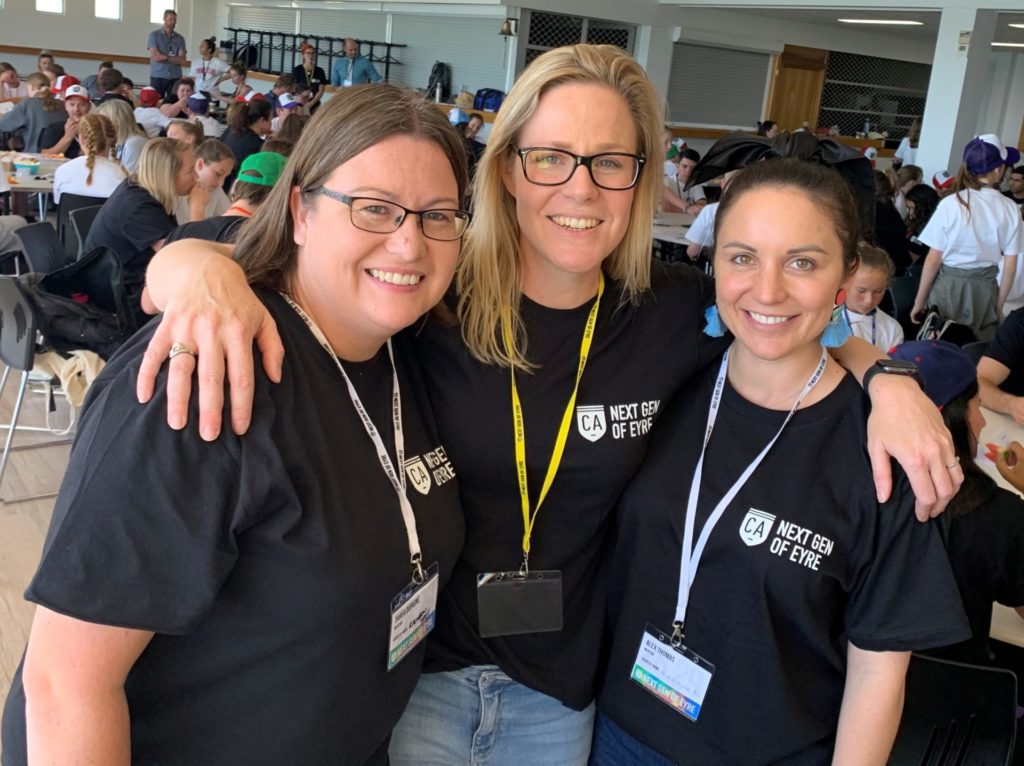We’re profiling women working in agriculture and related fields, thanks to the excellent support of AgriFutures Australia, in line with our weekly publication for women in agriculture, The Ag Wrap.
Tanya Dupagne has dedicated a significant chunk of her life to supporting women and young people around the world, teaching them skills and valuable lessons to build a brighter future.
But she’s now seeing those life lessons through a different lens, following a life-changing diagnosis of Chronic Lyme Disease in 2019, which followed a tick bite 15 years before the diagnosis.
Having spent the past 17 years running youth activity programs for over 130, 000 children and women throughout the world, she has become a recognised leader in her state of WA, but also on both a national and international level.
She moved from her hometown of Kwinana to the Wheatbelt to establish Camp Kulin eight years ago, creating a leadership development program for at risk children and those affected by trauma, with a program for women that soon followed. Her tireless efforts into building these programs and supporting her community led her to win the 2017 AgriFutures National Rural Women’s Award.

In 2019, Tanya was diagnosed with Chronic Lyme Disease and a number of coinfections. While it was a painful revelation for Tanya, she believes it’s brought upon a new purpose.
Tanya has since become an Ambassador of the Lyme Disease Association of Australia, and continues to use her voice to help raise awareness on the disease, while still undergoing intense medical treatment.
Women’s Agenda spoke with Tanya to learn more about her life’s work, and what has changed since her diagnosis.
Can you tell us a little bit about establishing Camp Kulin in 2013 and what it aims to do for women and youth in regional and rural areas of WA?
Camp Kulin was all about giving kids across WA, including those affected by trauma, the chance to attend a residential program to learn essential life skills – leadership, respect, trust, self confidence, self esteem, anger management, emotional regulation, communication – in an environment that was fun. The program showed positive results in both the short and long term, with many of our initial groups of campers returning as volunteers themselves years on. We had children from 338 towns across WA attend, with families travelling over 25 hours to bring their children to us. There was a 3 year wait for high needs children to attend camp, and we had a volunteer team of over 400.
The ladies camp program came about because as the mums were picking up their kids from camp they kept asking when they could come to camp too! With this program, we focused on the hidden leaders in rural communities – the mums on the school P&C, those involved with sports clubs and running events. These are the ladies who probably wouldn’t even consider themselves as leaders, but who have the local knowledge to really make a difference in their communities. This program resulted in ladies starting their own businesses, going for promotions at work, winning awards and improving their own life skills.
In 2019 you were diagnosed with Chronic Lyme Disease, and since have become an ambassador of the Lyme Disease Association of Australia. How has this diagnosis shaped your view of the world and shifted the way you do your work?
I had no idea when I was diagnosed what I was about to step into. I’ve lived in Africa, Asia, and America, and I always felt our health system was miles ahead. I thought if I ever got sick, it’d be easy to get the support and treatment I needed to make me better. How wrong I was!
I learnt fast that Lyme is one of the most controversial diseases in the country. Even when you contract it overseas in a Lyme endemic area from a known tick bite, and have multiple blood tests and scans from internationally accredited labs consistent with the disease, as I did, it’s near impossible to get diagnosed or treated here in Australia.
In fact, if you are lucky enough to find a Lyme literate doctor, you spend each day wondering if they are going to get struck off the medical register for treating you, like so many before them. As a result, it takes an average of 10 years for a Lyme patient to get a diagnosis, and by then, most are already seriously ill. In my case I was diagnosed 15 years after the tick bite. I will never understand how this can happen in a first world country like Australia.
Being so sick has opened my eyes to things I would never have thought about as a previously healthy person. I’ve lost some good friends who found it hard to deal with a friend who was sick all the time. I’ve seen the different ways people with disabilities are treated in the communities, and the day to day challenges they face. I’ve seen the stigma attached to “invisible illnesses” from the medical system and the community.
I also feel like I’ve become a number lost in medical and government systems that don’t know how to deal with me because I don’t have “acceptable” diseases. I’ve become ‘’that person” with a disability…but I’m also still Tanya, and that’s the bit bureaucracy forgets. My illnesses may be mostly invisible, but I’m not, and neither are the thousands of people like me facing similar battles.
At the same time, being sick has allowed me the chance to see the absolute best in people. I’ve been lucky enough to find an amazing medical team, 20 strong who are working together to get me better. I have a great network of friends around me who have supported me through every hurdle. I’ve had emails, gifts and texts from people I’ve worked with all over the world. This has taught me how much the little things really matter, and how the simplest act of kindness can change someone’s day.
I’ve learnt that I’m stronger than I ever thought I was, and I found courage I didn’t know I had. The words ‘perseverance’ and ‘persistence’ were ones I used to teach the kids I work with, but now they’ve taken on a whole new meaning for me as I fight this battle. I hope that when I’m better I can give back to some of those people who have given so much to me to get me through the past couple of years.

Can you share with us what a day in your life looks like?
At the moment, my day is about making it to the end of the day. Like most Lyme patients, I don’t just have Lyme. I have five other serious Lyme co-infections, Myalgic Encephalomyelitis, Fibromyalgia and a number of disorders linked to my legs. I also have Postural Orthostatic Tachycardia Syndrome (POTS), which basically means I’m allergic to gravity. If I stand or walk, my heart rate shoots through the roof, causing a number of debilitating symptoms.
The best way I can think of to describe living with a chronic illness to people is it is a bit like a battery on your phone, only my battery is broken. When most people wake up in the morning, they are fully charged and ready to go. For me, I’m already only 70% charged when I wake up, and every task I complete – even something as simple as standing – uses between three and ten times more battery than a healthy person. Healthy people have enough charge to get them through to the night, when they sleep to recharge again. By the time I get to 10am, after getting dressed and having breakfast, my body is already at low battery, and on a good day I struggle to make it past lunch time. On a really bad day, I can’t even get out of bed.
Another Lyme patient described going through treatment in a sentence to me – “Get up, survive, go back to bed”, and that’s what it feels like. I’ve learnt it’s as much a mental game as it is a physical game, so I’ve tried to stay positive and keep my sense of humour to make it through.
Where are you presently sitting in terms of your career, and what does the future look like to you?
I’m very determined (my friends would use the word stubborn!) so I totally believe that when my medical challenges have stabilised there’s still a lot I’ll be able to do.
The saying “rock bottom will teach you lessons that mountain tops never will” is one I now understand clearly. I still have all the knowledge, skills and experience I had before, but now I’ve also learnt so much about myself and grown so much through being sick, and gained a lot of strength and determination. The trick for me in moving forward is to piece all that together and use it to make a difference to those who really need it.
My illnesses mean I’m never going to be able to run programs the way I did before, but I’m looking into community development consultancy, advocacy work and training teachers, childcare workers and not-for-profit staff in the activities I was previously doing so they can pass them on to kids. I’ve already taken on a couple of advisory positions to keep my brain active, and board positions and university lecturing are an option too.
So many people have asked me to consider writing a book about my experiences with travel, work and what I am going through now, and I’m considering it. I’m a big believer that things happen for a reason, so I’d love to be able to share what’s happened to me to help make it easier for others who may face the same challenges in the future.
You had the honour of being named the 2017 National AgriFutures Rural Women’s Award Winner. How has winning this award helped support your career?
Winning this award was a game changer for me. It put my program into a national spotlight, which attracted large amounts of funding and support, in turn helping so many children and their families who desperately needed it. It helped me start the ladies camp program for rural women, which the ladies say has been life changing for them.
It opened up doors to other programs I didn’t know about, such as Westpac Scholars. They awarded me a social change fellowship in 2019 that enabled me to spend six weeks in America researching the top camp programs in the world, and attend leadership training at Harvard University.
The best bit about winning the award was the friendships I’ve made with other Alumni. Since getting sick, these amazing women have been such a huge support to me, even though they are located in all pockets of rural Australia.


